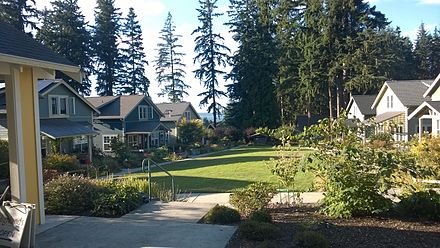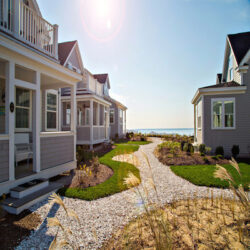Pocket Neighborhoods: Good Things in Small Packages
Category: Active adult communities
August 1, 2024 — Pocket Neighborhoods were a surprising favorite in our recent poll of your preferred type of community for retirement. (Use this link to see all results from the poll). Last week we did a feature on another winner, New Urban Communities, so here is the lowdown what you need to know about pocket neighborhoods along with some outstanding examples.
What is a Pocket Neighborhood?
The most common characteristic of a pocket neighborhood is a group of small homes or cottages sharing a common, open space. That area might be for gardens, pedestrian walkways, shared yards, or gathering places, and recreation. The idea is to promote a close knit sense of community and neighborliness with an increased level of contact. These usable public spaces belong to everyone who lives in that neighborhood.
Instead of roads and driveways dominating the landscape, access for cars is normally through alleys behind the residences, or in a discrete parking area. While the name and the communities are new, the idea is old and traditional – villages and city neighborhoods in Europe and New England (think homes clustered along the green). Pocket neighborhoods exist in a variety of environments – rural, in cities, or even the suburbs. Another aspect of pocket neighborhoods is that they are small scale – sometimes not more than 12 homes (although many pocket neighborhoods might be linked together by walkways). Homes are usually smaller and closer together than in existing towns and suburbs. The movement is in some ways an extension of residential cluster housing, where a group of homes might be built on fairly large piece of property, but the homes are close together to create large common spaces.
Are pocket neighborhoods good for 55+?
While we are aware of only a few pocket neighborhoods built expressly for those 55+, it seems like a significant number of the people attracted to them are of retirement age. That said, one of the attractions is the idea of living next to and relating to people of all ages, not just older people. In these shared settings neighbors get to know one another; children learn to appreciate their empty nester or single neighbors, families enjoy people of all ages, and retirees feel like they have not been put in a retirement ward. One possibility for retirement is the idea of building your own pocket neighborhood with like-minded friends. Zoning issues can be difficult, but not impossible. The idea of shared resources and known neighbors might make that effort worth it (see Cohousing).
Pocket neighborhoods are intentionally designed to afford opportunities for chance meetings – parking areas and/or garages are usually located away from the homes to necessitate a short walk through common areas. Mailboxes are often clustered in a central spot to insure that neighbors have a chance for interaction. But privacy is important too. Homes are oriented to offer several layers of privacy, such as low fences, private outdoor areas, and some windows facing walls without windows.

These highly social neighborhoods are promoted as an alternative to the sprawl, isolation, expense, and automobile focus of suburban developments. Ross Chapin Architects apparently coined the term, and specialize in Pocket Neighborhoods. One of their first was the Third Street Cottages, open to all ages, on Whidbey Island in Puget Sound. On their website you can find photos and information on at least 15 of their projects including Conover Common Cottages in Redmond (most if not all of their communities are on the west coast). This is a great source for finding out more details about Pocket Neighborhoods.
The downsides
Living in a pocket neighborhood is not for everyone. If you crave privacy and don’t like running into your neighbors, stay away. Homes tend to be smaller. And most of these communities are all ages, so if you only want to be the 55+ crowd you won’t be happy.
Don’t Miss Out on Your Dream Retirement Spot
Free Weekly “Best Places” Newsletter – with Free Report
Where can you find pocket neighborhoods
Because of their small scale, pocket neighborhoods do not tend to attract developers with big advertising budgets. So you might have to seek them out yourself. Audubon Circle in Boston is one, identified by 20 sculpted bird silhouettes over one of the city’s busiest intersections and near Fenway Park. A small neighborhood in Fife has a pocket neighborhood of 12 homes built in the 1930s. Those include Concord Riverwalk in Boston and Vandalia Cottages in Franklin, Tennessee.

Heritage Sands has 60 cottages overlooking Nantucket Sound in Dennisport, Cape Cod.
Although only a few of the communities profiled on Topretirements are identified as Pocket Neighborhoods, we hope more are added. To find them use our Community Explorer. Select a State, then check Pocket Neighborhood under “Unit Types”. Note: Some of the communities that create these listings have a loose interpretation of Pocket Neighborhoods.
For further reading
Tiny Homes blog post
Wikipedia on Pocket Neighborhoods
AARP on Pocket Neighborhoods
Residential cluster housing
Bottom line
If you are tired of driving everywhere there are plenty of places where you can retire and walk to just about everything you need. To get you started we have provided you with some ideas here.
Comments: Would you live in a Pocket Neighborhood, or do you have any experience with one? Please share your thoughts in the Comments section below.






Comments on "Pocket Neighborhoods: Good Things in Small Packages"
Yolande says:
Just looked up WaterSong in FL. It's not a pocket neighborhood but a huge 55+ new pricey home development. FL is very expensive now, not affordable as some would love to believe. I've had a difficult time finding anything affordable or decent there. It's a huge turn off.
Admin says:
Good point Yolande. Some of these communities claim to be pocket neighborhoods but they are not really. We deleted this one from the post and changed the community listing to reflect that. Prices on just about every kind of home have gotten high - not enough being built.
Admin says:
It takes a special kind of person to like these pocket neighborhoods. You have to like to be around other people in relatively small spaces.
It front those people it can be wonderful. In some ways it is not a whole lot different than living in an active adult community.